Macquarie University BUSL320 Taxation Law Assignment Solution
VerifiedAdded on 2022/10/17
|9
|1734
|32
Homework Assignment
AI Summary
This assignment solution analyzes the tax implications of various income sources and financial transactions for an individual named Rod McLean. It addresses key issues such as whether salary income, airline tickets and vouchers, annual salary, and compensation payments attract tax liability. The solution references relevant sections of the ITAA 1936 and ITAA 1997, along with supporting case law, to determine the tax treatment of different income types, including ordinary income, fringe benefits, and capital gains. The analysis covers Rod's employment in Hong Kong, contract agreements, and joining bonuses, providing a detailed breakdown of what is considered taxable and what is not. The conclusion summarizes the tax liabilities based on the application of the law to the given facts.
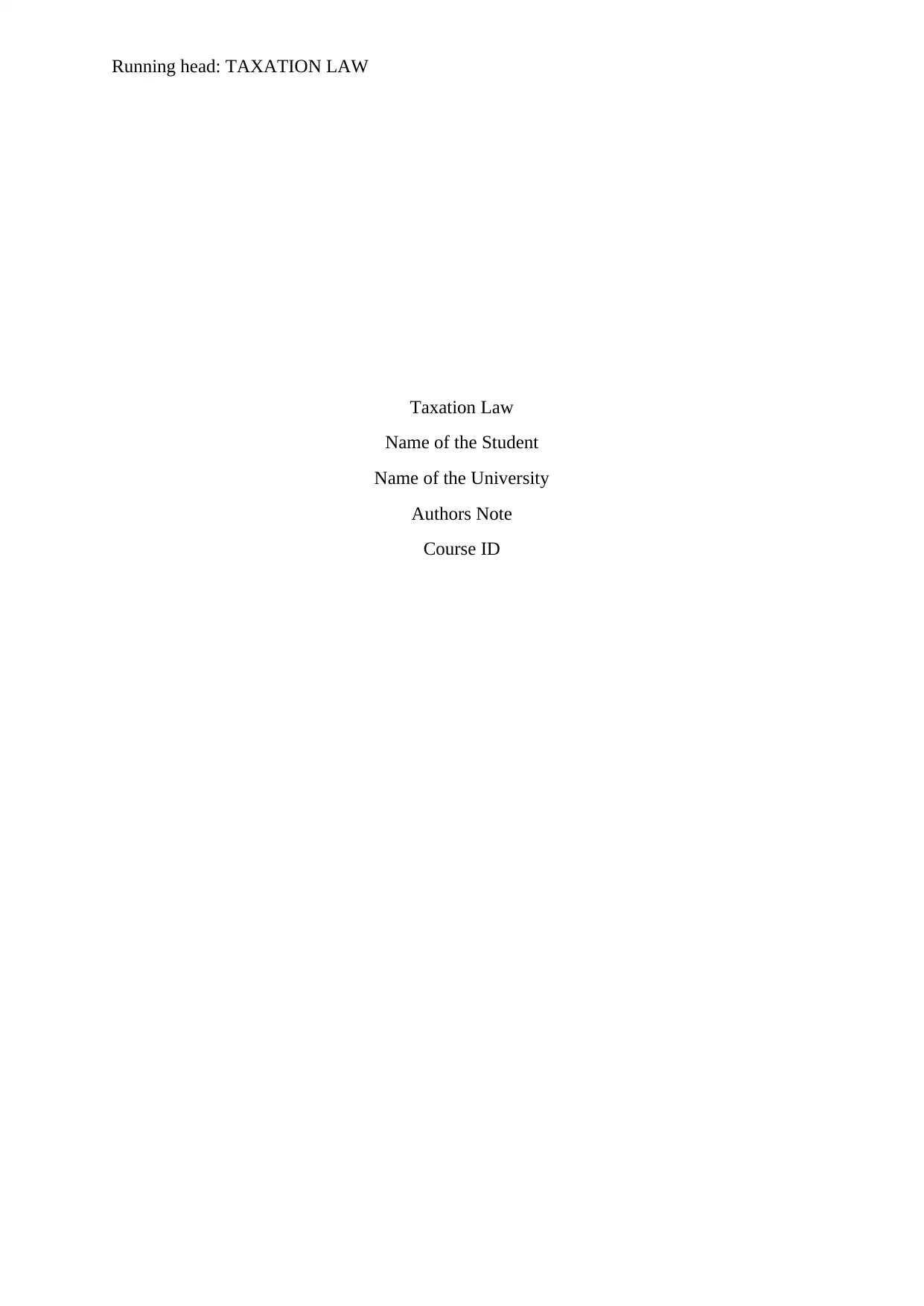
Running head: TAXATION LAW
Taxation Law
Name of the Student
Name of the University
Authors Note
Course ID
Taxation Law
Name of the Student
Name of the University
Authors Note
Course ID
Paraphrase This Document
Need a fresh take? Get an instant paraphrase of this document with our AI Paraphraser
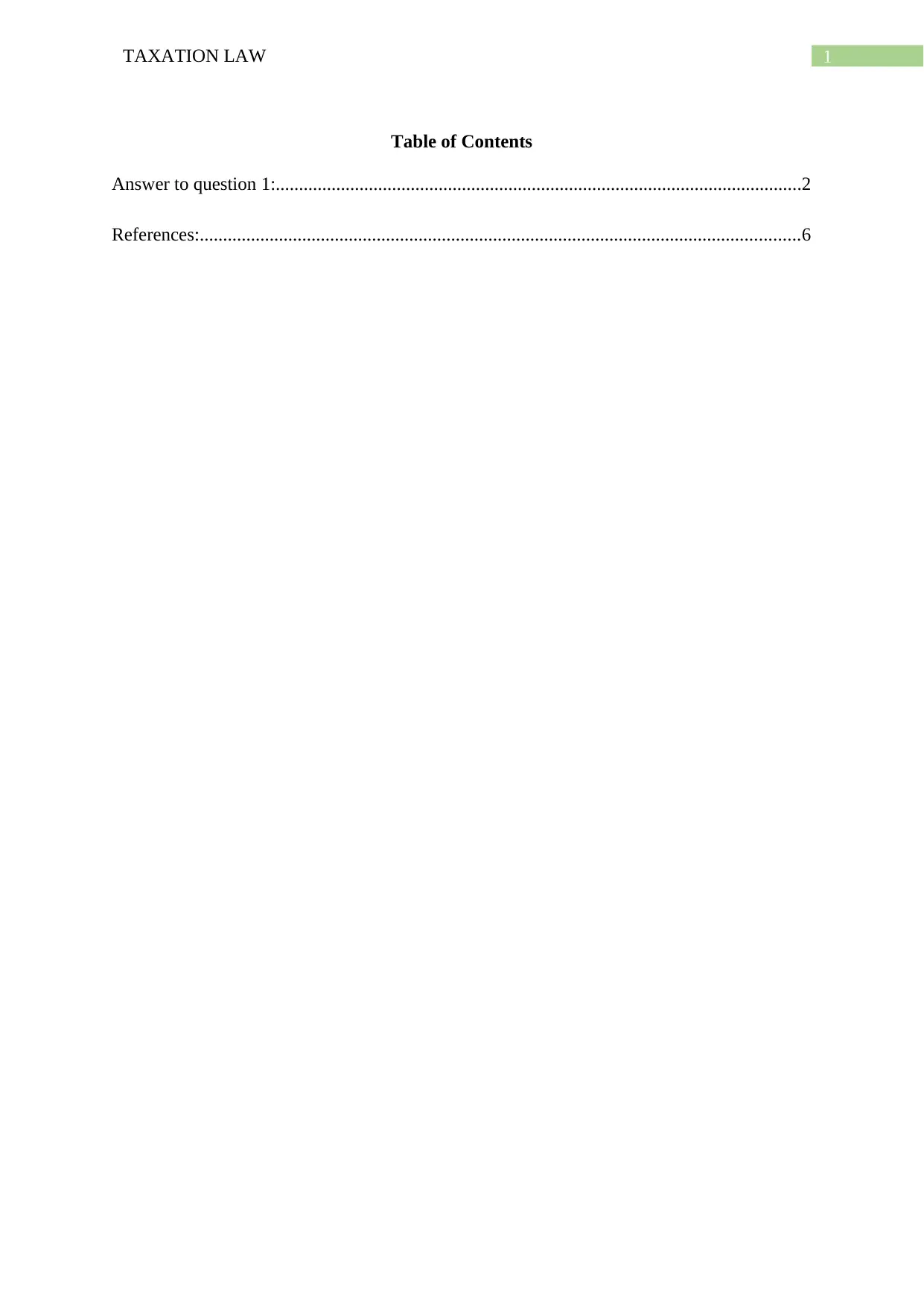
1TAXATION LAW
Table of Contents
Answer to question 1:.................................................................................................................2
References:.................................................................................................................................6
Table of Contents
Answer to question 1:.................................................................................................................2
References:.................................................................................................................................6
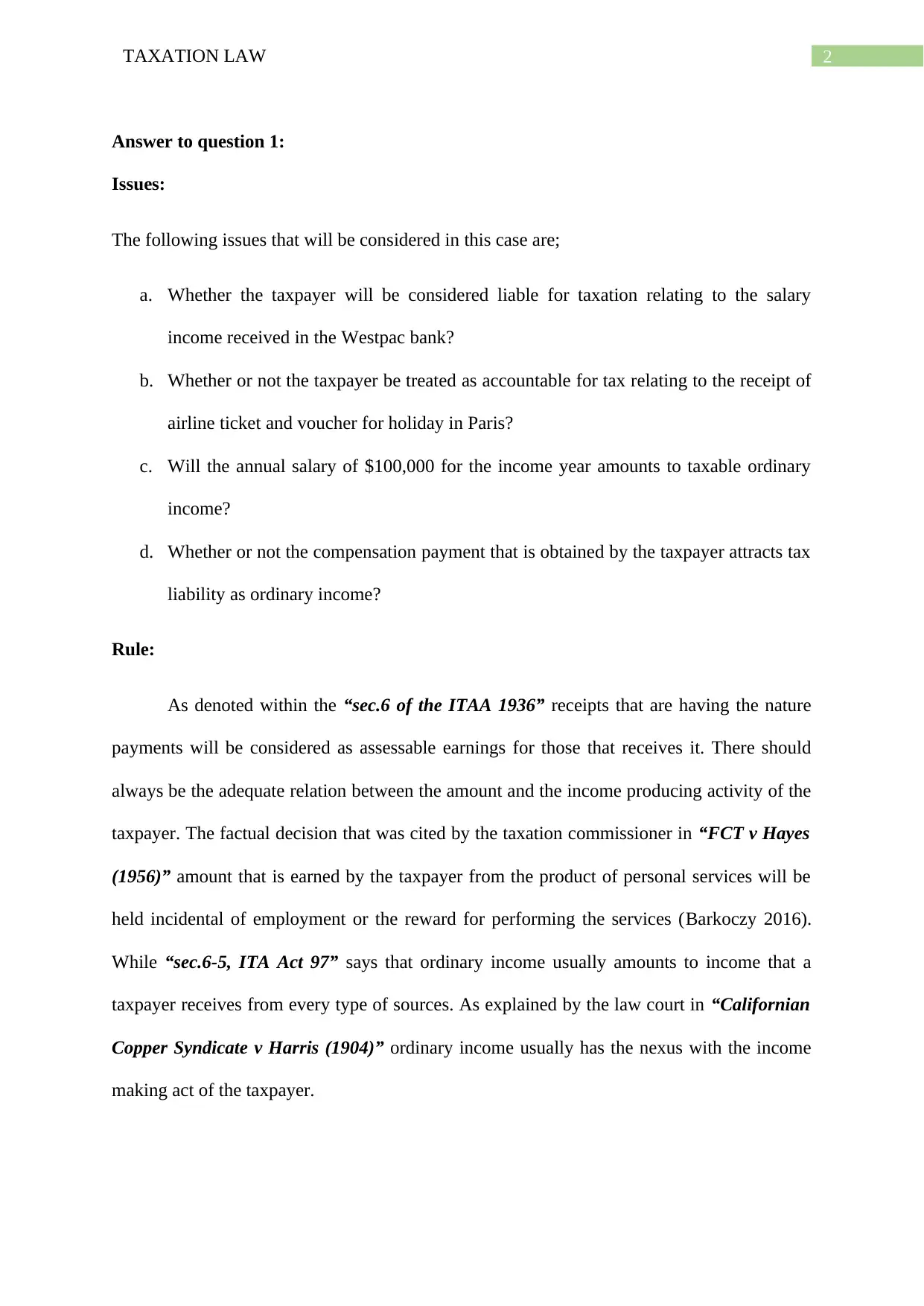
2TAXATION LAW
Answer to question 1:
Issues:
The following issues that will be considered in this case are;
a. Whether the taxpayer will be considered liable for taxation relating to the salary
income received in the Westpac bank?
b. Whether or not the taxpayer be treated as accountable for tax relating to the receipt of
airline ticket and voucher for holiday in Paris?
c. Will the annual salary of $100,000 for the income year amounts to taxable ordinary
income?
d. Whether or not the compensation payment that is obtained by the taxpayer attracts tax
liability as ordinary income?
Rule:
As denoted within the “sec.6 of the ITAA 1936” receipts that are having the nature
payments will be considered as assessable earnings for those that receives it. There should
always be the adequate relation between the amount and the income producing activity of the
taxpayer. The factual decision that was cited by the taxation commissioner in “FCT v Hayes
(1956)” amount that is earned by the taxpayer from the product of personal services will be
held incidental of employment or the reward for performing the services (Barkoczy 2016).
While “sec.6-5, ITA Act 97” says that ordinary income usually amounts to income that a
taxpayer receives from every type of sources. As explained by the law court in “Californian
Copper Syndicate v Harris (1904)” ordinary income usually has the nexus with the income
making act of the taxpayer.
Answer to question 1:
Issues:
The following issues that will be considered in this case are;
a. Whether the taxpayer will be considered liable for taxation relating to the salary
income received in the Westpac bank?
b. Whether or not the taxpayer be treated as accountable for tax relating to the receipt of
airline ticket and voucher for holiday in Paris?
c. Will the annual salary of $100,000 for the income year amounts to taxable ordinary
income?
d. Whether or not the compensation payment that is obtained by the taxpayer attracts tax
liability as ordinary income?
Rule:
As denoted within the “sec.6 of the ITAA 1936” receipts that are having the nature
payments will be considered as assessable earnings for those that receives it. There should
always be the adequate relation between the amount and the income producing activity of the
taxpayer. The factual decision that was cited by the taxation commissioner in “FCT v Hayes
(1956)” amount that is earned by the taxpayer from the product of personal services will be
held incidental of employment or the reward for performing the services (Barkoczy 2016).
While “sec.6-5, ITA Act 97” says that ordinary income usually amounts to income that a
taxpayer receives from every type of sources. As explained by the law court in “Californian
Copper Syndicate v Harris (1904)” ordinary income usually has the nexus with the income
making act of the taxpayer.
⊘ This is a preview!⊘
Do you want full access?
Subscribe today to unlock all pages.

Trusted by 1+ million students worldwide
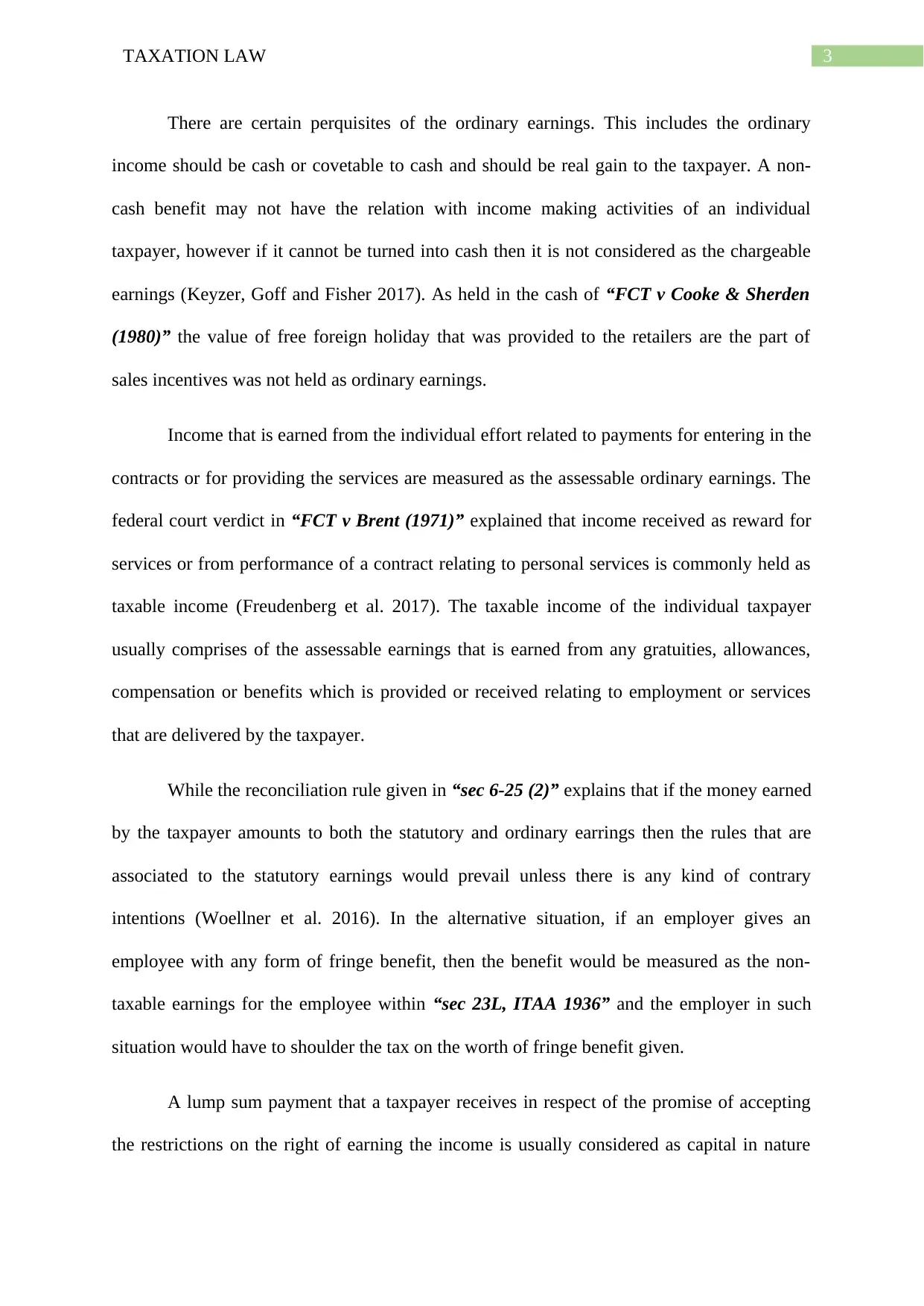
3TAXATION LAW
There are certain perquisites of the ordinary earnings. This includes the ordinary
income should be cash or covetable to cash and should be real gain to the taxpayer. A non-
cash benefit may not have the relation with income making activities of an individual
taxpayer, however if it cannot be turned into cash then it is not considered as the chargeable
earnings (Keyzer, Goff and Fisher 2017). As held in the cash of “FCT v Cooke & Sherden
(1980)” the value of free foreign holiday that was provided to the retailers are the part of
sales incentives was not held as ordinary earnings.
Income that is earned from the individual effort related to payments for entering in the
contracts or for providing the services are measured as the assessable ordinary earnings. The
federal court verdict in “FCT v Brent (1971)” explained that income received as reward for
services or from performance of a contract relating to personal services is commonly held as
taxable income (Freudenberg et al. 2017). The taxable income of the individual taxpayer
usually comprises of the assessable earnings that is earned from any gratuities, allowances,
compensation or benefits which is provided or received relating to employment or services
that are delivered by the taxpayer.
While the reconciliation rule given in “sec 6-25 (2)” explains that if the money earned
by the taxpayer amounts to both the statutory and ordinary earrings then the rules that are
associated to the statutory earnings would prevail unless there is any kind of contrary
intentions (Woellner et al. 2016). In the alternative situation, if an employer gives an
employee with any form of fringe benefit, then the benefit would be measured as the non-
taxable earnings for the employee within “sec 23L, ITAA 1936” and the employer in such
situation would have to shoulder the tax on the worth of fringe benefit given.
A lump sum payment that a taxpayer receives in respect of the promise of accepting
the restrictions on the right of earning the income is usually considered as capital in nature
There are certain perquisites of the ordinary earnings. This includes the ordinary
income should be cash or covetable to cash and should be real gain to the taxpayer. A non-
cash benefit may not have the relation with income making activities of an individual
taxpayer, however if it cannot be turned into cash then it is not considered as the chargeable
earnings (Keyzer, Goff and Fisher 2017). As held in the cash of “FCT v Cooke & Sherden
(1980)” the value of free foreign holiday that was provided to the retailers are the part of
sales incentives was not held as ordinary earnings.
Income that is earned from the individual effort related to payments for entering in the
contracts or for providing the services are measured as the assessable ordinary earnings. The
federal court verdict in “FCT v Brent (1971)” explained that income received as reward for
services or from performance of a contract relating to personal services is commonly held as
taxable income (Freudenberg et al. 2017). The taxable income of the individual taxpayer
usually comprises of the assessable earnings that is earned from any gratuities, allowances,
compensation or benefits which is provided or received relating to employment or services
that are delivered by the taxpayer.
While the reconciliation rule given in “sec 6-25 (2)” explains that if the money earned
by the taxpayer amounts to both the statutory and ordinary earrings then the rules that are
associated to the statutory earnings would prevail unless there is any kind of contrary
intentions (Woellner et al. 2016). In the alternative situation, if an employer gives an
employee with any form of fringe benefit, then the benefit would be measured as the non-
taxable earnings for the employee within “sec 23L, ITAA 1936” and the employer in such
situation would have to shoulder the tax on the worth of fringe benefit given.
A lump sum payment that a taxpayer receives in respect of the promise of accepting
the restrictions on the right of earning the income is usually considered as capital in nature
Paraphrase This Document
Need a fresh take? Get an instant paraphrase of this document with our AI Paraphraser
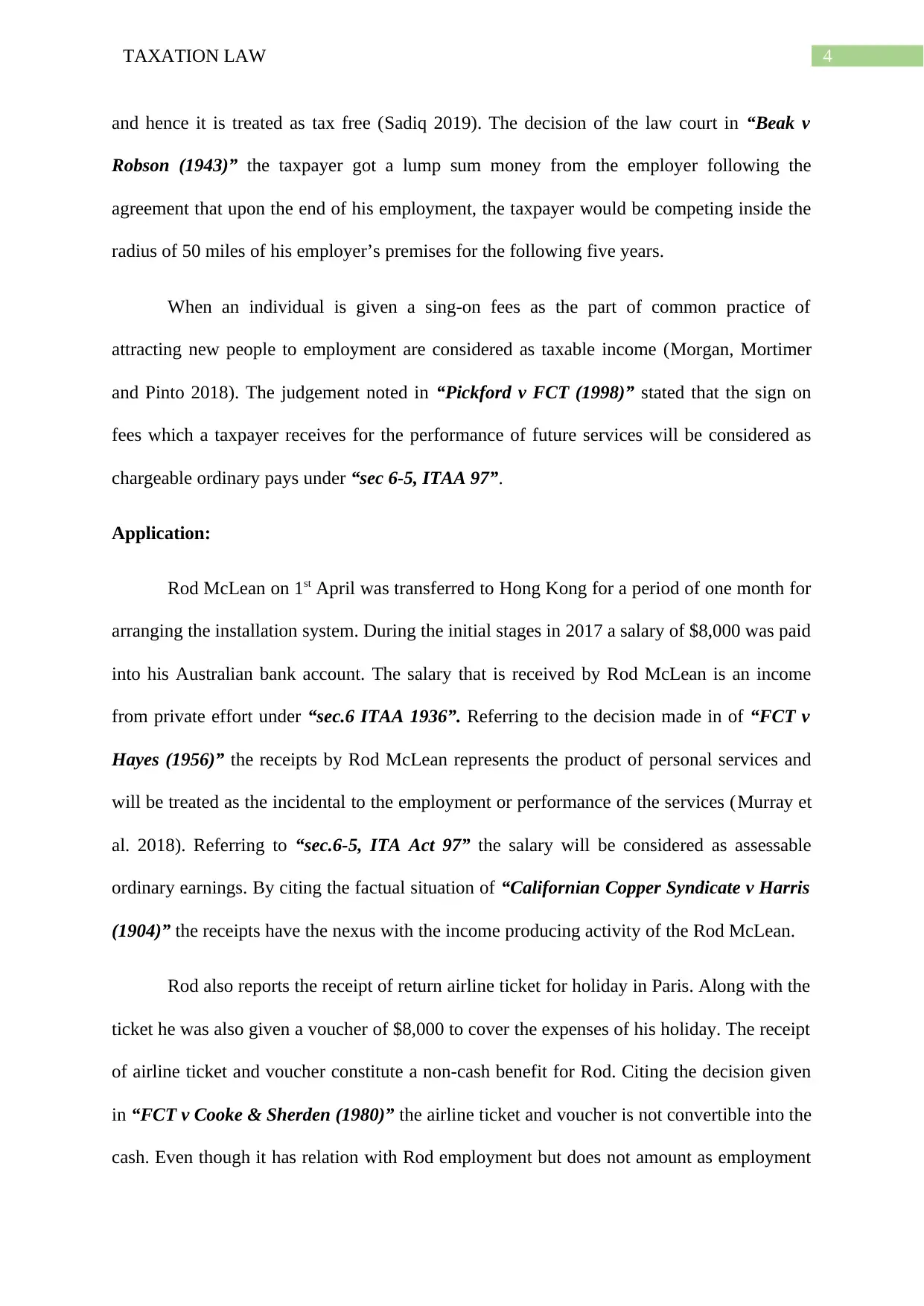
4TAXATION LAW
and hence it is treated as tax free (Sadiq 2019). The decision of the law court in “Beak v
Robson (1943)” the taxpayer got a lump sum money from the employer following the
agreement that upon the end of his employment, the taxpayer would be competing inside the
radius of 50 miles of his employer’s premises for the following five years.
When an individual is given a sing-on fees as the part of common practice of
attracting new people to employment are considered as taxable income (Morgan, Mortimer
and Pinto 2018). The judgement noted in “Pickford v FCT (1998)” stated that the sign on
fees which a taxpayer receives for the performance of future services will be considered as
chargeable ordinary pays under “sec 6-5, ITAA 97”.
Application:
Rod McLean on 1st April was transferred to Hong Kong for a period of one month for
arranging the installation system. During the initial stages in 2017 a salary of $8,000 was paid
into his Australian bank account. The salary that is received by Rod McLean is an income
from private effort under “sec.6 ITAA 1936”. Referring to the decision made in of “FCT v
Hayes (1956)” the receipts by Rod McLean represents the product of personal services and
will be treated as the incidental to the employment or performance of the services (Murray et
al. 2018). Referring to “sec.6-5, ITA Act 97” the salary will be considered as assessable
ordinary earnings. By citing the factual situation of “Californian Copper Syndicate v Harris
(1904)” the receipts have the nexus with the income producing activity of the Rod McLean.
Rod also reports the receipt of return airline ticket for holiday in Paris. Along with the
ticket he was also given a voucher of $8,000 to cover the expenses of his holiday. The receipt
of airline ticket and voucher constitute a non-cash benefit for Rod. Citing the decision given
in “FCT v Cooke & Sherden (1980)” the airline ticket and voucher is not convertible into the
cash. Even though it has relation with Rod employment but does not amount as employment
and hence it is treated as tax free (Sadiq 2019). The decision of the law court in “Beak v
Robson (1943)” the taxpayer got a lump sum money from the employer following the
agreement that upon the end of his employment, the taxpayer would be competing inside the
radius of 50 miles of his employer’s premises for the following five years.
When an individual is given a sing-on fees as the part of common practice of
attracting new people to employment are considered as taxable income (Morgan, Mortimer
and Pinto 2018). The judgement noted in “Pickford v FCT (1998)” stated that the sign on
fees which a taxpayer receives for the performance of future services will be considered as
chargeable ordinary pays under “sec 6-5, ITAA 97”.
Application:
Rod McLean on 1st April was transferred to Hong Kong for a period of one month for
arranging the installation system. During the initial stages in 2017 a salary of $8,000 was paid
into his Australian bank account. The salary that is received by Rod McLean is an income
from private effort under “sec.6 ITAA 1936”. Referring to the decision made in of “FCT v
Hayes (1956)” the receipts by Rod McLean represents the product of personal services and
will be treated as the incidental to the employment or performance of the services (Murray et
al. 2018). Referring to “sec.6-5, ITA Act 97” the salary will be considered as assessable
ordinary earnings. By citing the factual situation of “Californian Copper Syndicate v Harris
(1904)” the receipts have the nexus with the income producing activity of the Rod McLean.
Rod also reports the receipt of return airline ticket for holiday in Paris. Along with the
ticket he was also given a voucher of $8,000 to cover the expenses of his holiday. The receipt
of airline ticket and voucher constitute a non-cash benefit for Rod. Citing the decision given
in “FCT v Cooke & Sherden (1980)” the airline ticket and voucher is not convertible into the
cash. Even though it has relation with Rod employment but does not amount as employment
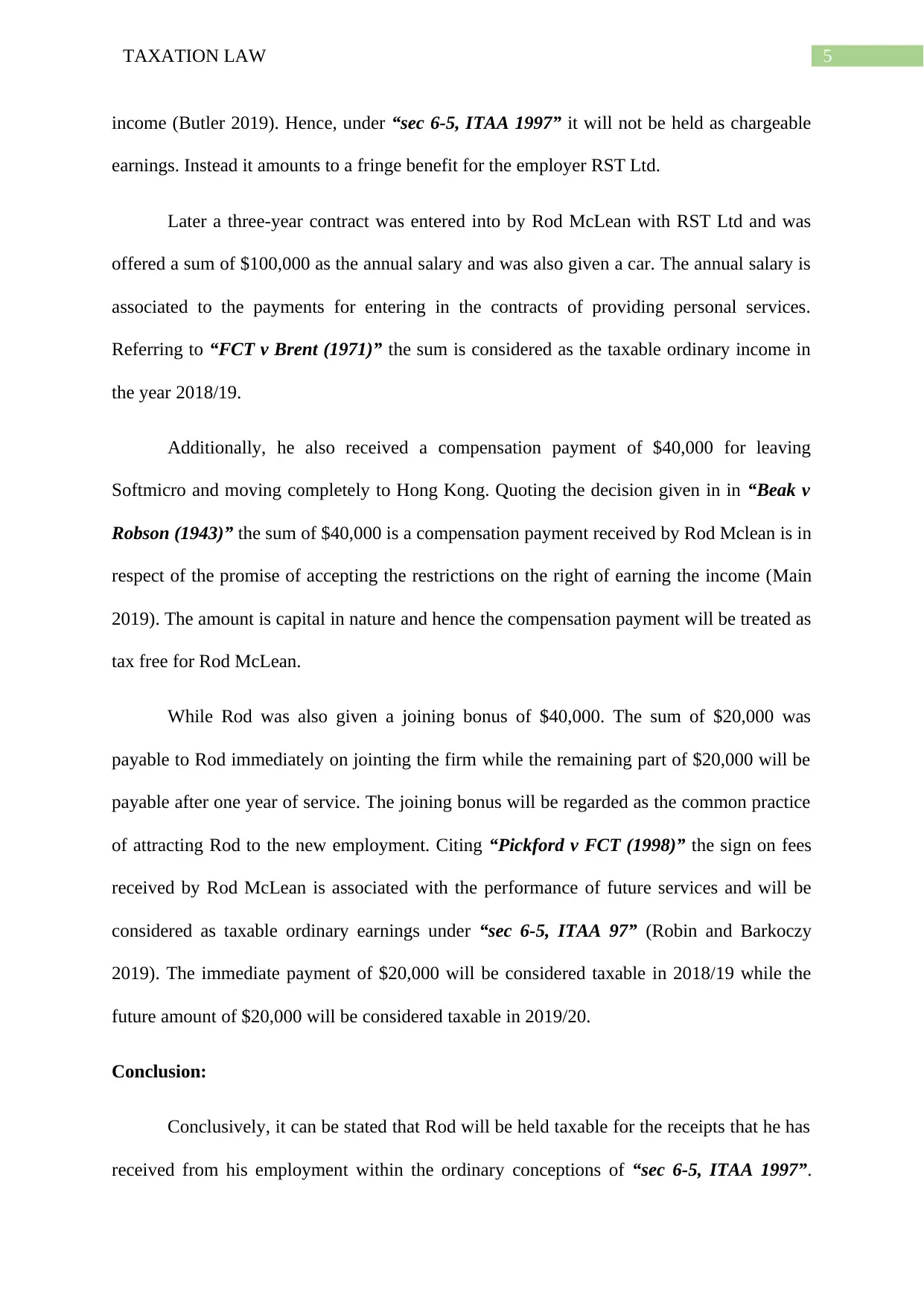
5TAXATION LAW
income (Butler 2019). Hence, under “sec 6-5, ITAA 1997” it will not be held as chargeable
earnings. Instead it amounts to a fringe benefit for the employer RST Ltd.
Later a three-year contract was entered into by Rod McLean with RST Ltd and was
offered a sum of $100,000 as the annual salary and was also given a car. The annual salary is
associated to the payments for entering in the contracts of providing personal services.
Referring to “FCT v Brent (1971)” the sum is considered as the taxable ordinary income in
the year 2018/19.
Additionally, he also received a compensation payment of $40,000 for leaving
Softmicro and moving completely to Hong Kong. Quoting the decision given in in “Beak v
Robson (1943)” the sum of $40,000 is a compensation payment received by Rod Mclean is in
respect of the promise of accepting the restrictions on the right of earning the income (Main
2019). The amount is capital in nature and hence the compensation payment will be treated as
tax free for Rod McLean.
While Rod was also given a joining bonus of $40,000. The sum of $20,000 was
payable to Rod immediately on jointing the firm while the remaining part of $20,000 will be
payable after one year of service. The joining bonus will be regarded as the common practice
of attracting Rod to the new employment. Citing “Pickford v FCT (1998)” the sign on fees
received by Rod McLean is associated with the performance of future services and will be
considered as taxable ordinary earnings under “sec 6-5, ITAA 97” (Robin and Barkoczy
2019). The immediate payment of $20,000 will be considered taxable in 2018/19 while the
future amount of $20,000 will be considered taxable in 2019/20.
Conclusion:
Conclusively, it can be stated that Rod will be held taxable for the receipts that he has
received from his employment within the ordinary conceptions of “sec 6-5, ITAA 1997”.
income (Butler 2019). Hence, under “sec 6-5, ITAA 1997” it will not be held as chargeable
earnings. Instead it amounts to a fringe benefit for the employer RST Ltd.
Later a three-year contract was entered into by Rod McLean with RST Ltd and was
offered a sum of $100,000 as the annual salary and was also given a car. The annual salary is
associated to the payments for entering in the contracts of providing personal services.
Referring to “FCT v Brent (1971)” the sum is considered as the taxable ordinary income in
the year 2018/19.
Additionally, he also received a compensation payment of $40,000 for leaving
Softmicro and moving completely to Hong Kong. Quoting the decision given in in “Beak v
Robson (1943)” the sum of $40,000 is a compensation payment received by Rod Mclean is in
respect of the promise of accepting the restrictions on the right of earning the income (Main
2019). The amount is capital in nature and hence the compensation payment will be treated as
tax free for Rod McLean.
While Rod was also given a joining bonus of $40,000. The sum of $20,000 was
payable to Rod immediately on jointing the firm while the remaining part of $20,000 will be
payable after one year of service. The joining bonus will be regarded as the common practice
of attracting Rod to the new employment. Citing “Pickford v FCT (1998)” the sign on fees
received by Rod McLean is associated with the performance of future services and will be
considered as taxable ordinary earnings under “sec 6-5, ITAA 97” (Robin and Barkoczy
2019). The immediate payment of $20,000 will be considered taxable in 2018/19 while the
future amount of $20,000 will be considered taxable in 2019/20.
Conclusion:
Conclusively, it can be stated that Rod will be held taxable for the receipts that he has
received from his employment within the ordinary conceptions of “sec 6-5, ITAA 1997”.
⊘ This is a preview!⊘
Do you want full access?
Subscribe today to unlock all pages.

Trusted by 1+ million students worldwide
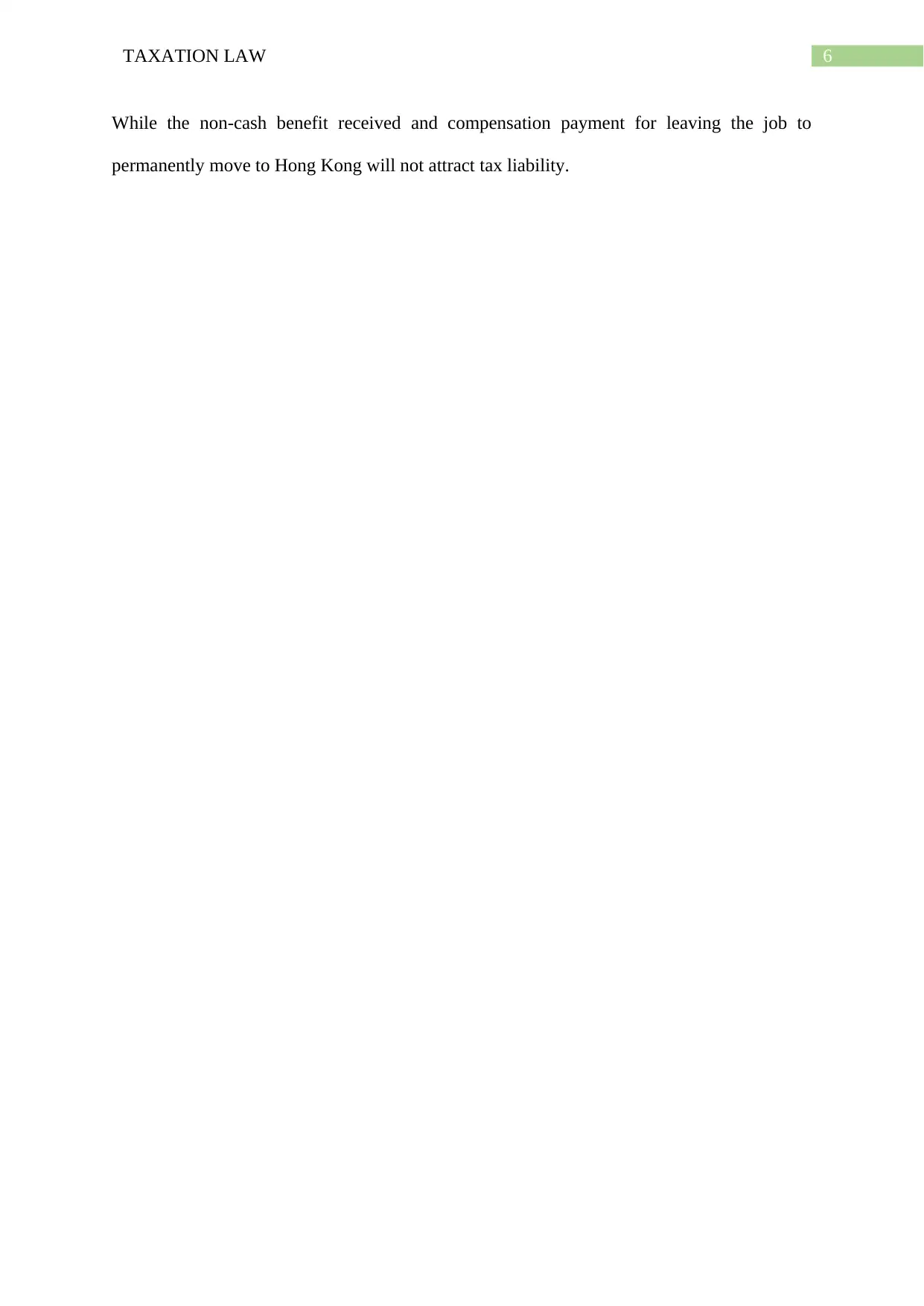
6TAXATION LAW
While the non-cash benefit received and compensation payment for leaving the job to
permanently move to Hong Kong will not attract tax liability.
While the non-cash benefit received and compensation payment for leaving the job to
permanently move to Hong Kong will not attract tax liability.
Paraphrase This Document
Need a fresh take? Get an instant paraphrase of this document with our AI Paraphraser
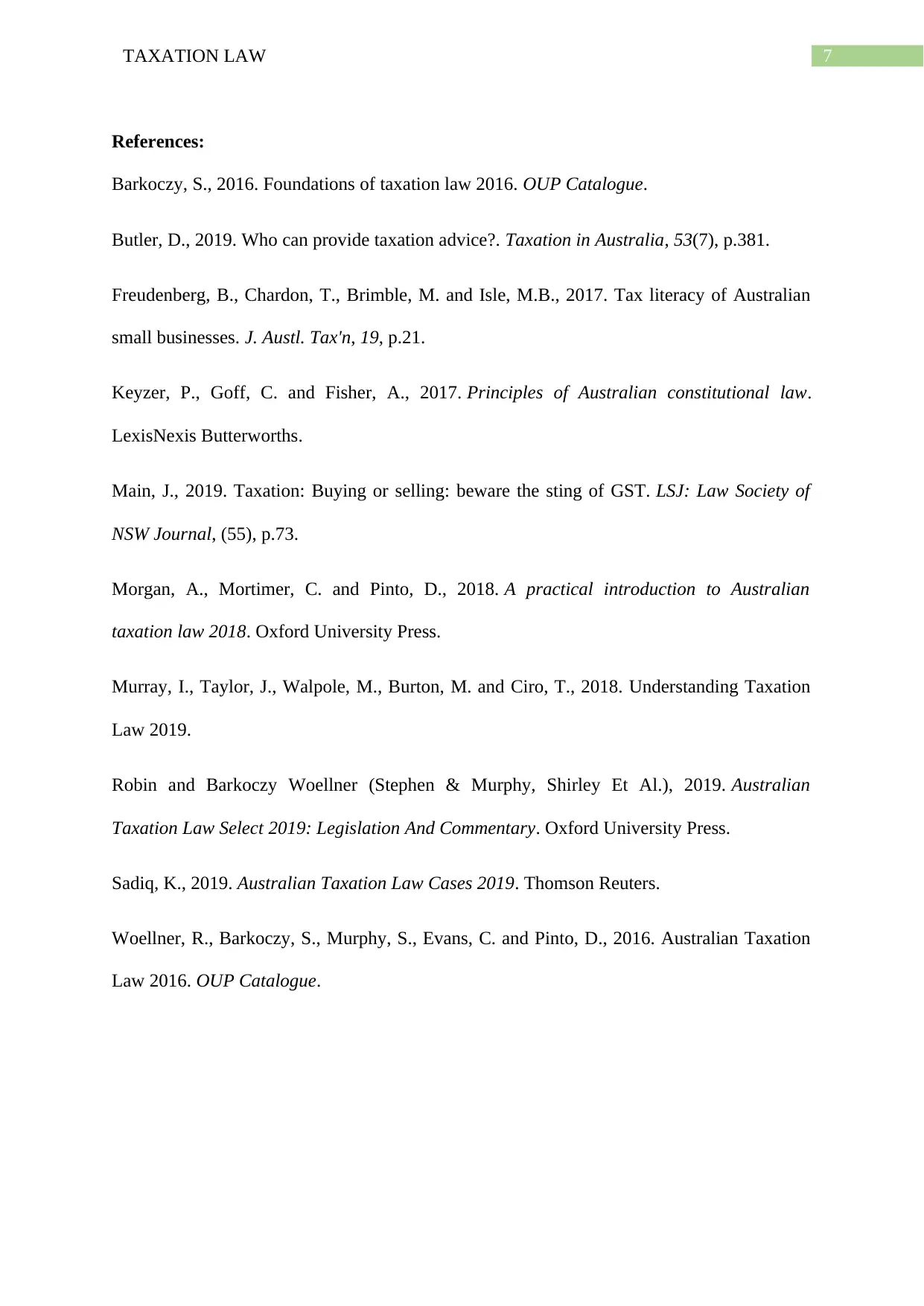
7TAXATION LAW
References:
Barkoczy, S., 2016. Foundations of taxation law 2016. OUP Catalogue.
Butler, D., 2019. Who can provide taxation advice?. Taxation in Australia, 53(7), p.381.
Freudenberg, B., Chardon, T., Brimble, M. and Isle, M.B., 2017. Tax literacy of Australian
small businesses. J. Austl. Tax'n, 19, p.21.
Keyzer, P., Goff, C. and Fisher, A., 2017. Principles of Australian constitutional law.
LexisNexis Butterworths.
Main, J., 2019. Taxation: Buying or selling: beware the sting of GST. LSJ: Law Society of
NSW Journal, (55), p.73.
Morgan, A., Mortimer, C. and Pinto, D., 2018. A practical introduction to Australian
taxation law 2018. Oxford University Press.
Murray, I., Taylor, J., Walpole, M., Burton, M. and Ciro, T., 2018. Understanding Taxation
Law 2019.
Robin and Barkoczy Woellner (Stephen & Murphy, Shirley Et Al.), 2019. Australian
Taxation Law Select 2019: Legislation And Commentary. Oxford University Press.
Sadiq, K., 2019. Australian Taxation Law Cases 2019. Thomson Reuters.
Woellner, R., Barkoczy, S., Murphy, S., Evans, C. and Pinto, D., 2016. Australian Taxation
Law 2016. OUP Catalogue.
References:
Barkoczy, S., 2016. Foundations of taxation law 2016. OUP Catalogue.
Butler, D., 2019. Who can provide taxation advice?. Taxation in Australia, 53(7), p.381.
Freudenberg, B., Chardon, T., Brimble, M. and Isle, M.B., 2017. Tax literacy of Australian
small businesses. J. Austl. Tax'n, 19, p.21.
Keyzer, P., Goff, C. and Fisher, A., 2017. Principles of Australian constitutional law.
LexisNexis Butterworths.
Main, J., 2019. Taxation: Buying or selling: beware the sting of GST. LSJ: Law Society of
NSW Journal, (55), p.73.
Morgan, A., Mortimer, C. and Pinto, D., 2018. A practical introduction to Australian
taxation law 2018. Oxford University Press.
Murray, I., Taylor, J., Walpole, M., Burton, M. and Ciro, T., 2018. Understanding Taxation
Law 2019.
Robin and Barkoczy Woellner (Stephen & Murphy, Shirley Et Al.), 2019. Australian
Taxation Law Select 2019: Legislation And Commentary. Oxford University Press.
Sadiq, K., 2019. Australian Taxation Law Cases 2019. Thomson Reuters.
Woellner, R., Barkoczy, S., Murphy, S., Evans, C. and Pinto, D., 2016. Australian Taxation
Law 2016. OUP Catalogue.

8TAXATION LAW
⊘ This is a preview!⊘
Do you want full access?
Subscribe today to unlock all pages.

Trusted by 1+ million students worldwide
1 out of 9
Related Documents
Your All-in-One AI-Powered Toolkit for Academic Success.
+13062052269
info@desklib.com
Available 24*7 on WhatsApp / Email
![[object Object]](/_next/static/media/star-bottom.7253800d.svg)
Unlock your academic potential
Copyright © 2020–2026 A2Z Services. All Rights Reserved. Developed and managed by ZUCOL.





